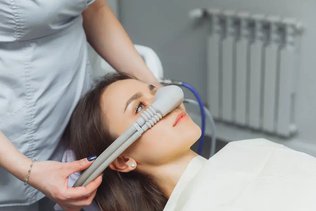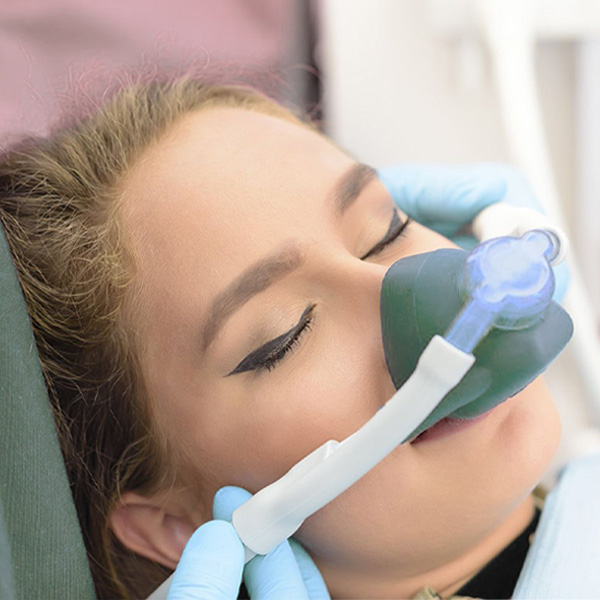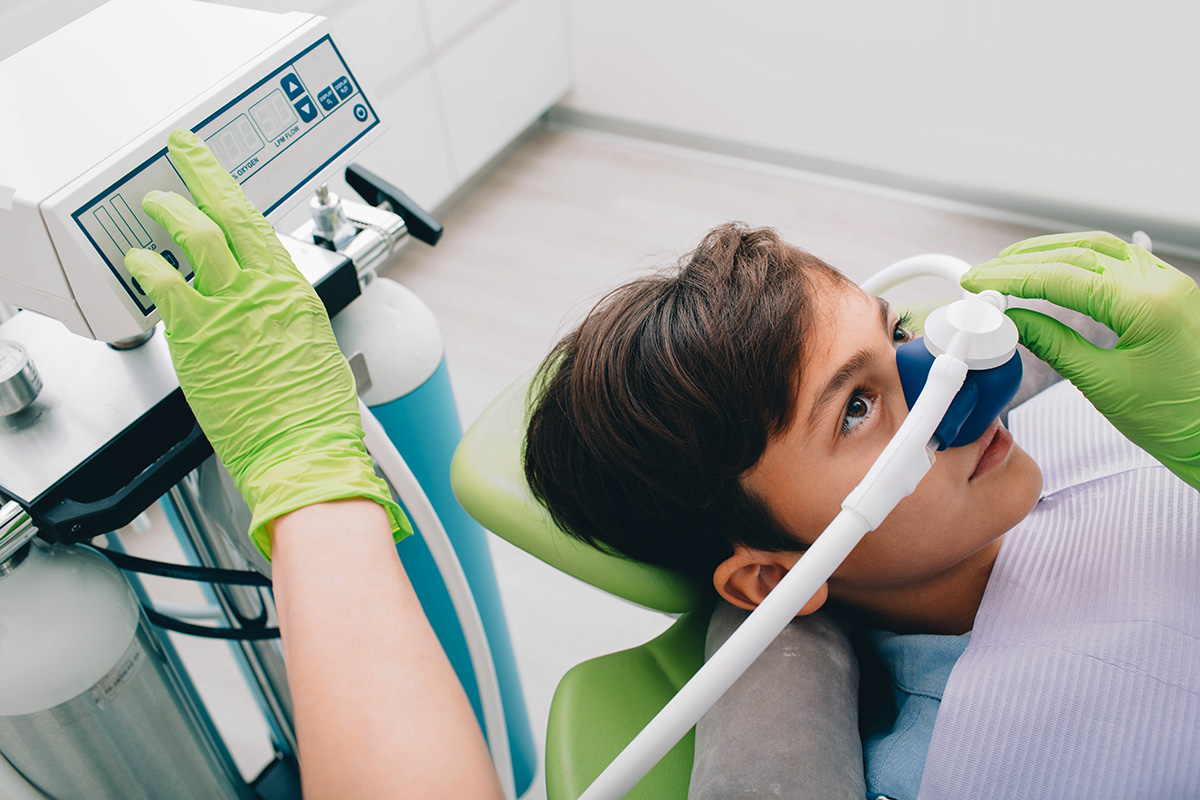
Different Types of Dental Sedation: Which Is Right for You?
Dental anxiety is a common concern that can make even routine dental visits a daunting prospect for some individuals. Fortunately, modern dentistry offers various forms of dental sedation to help patients relax during their appointments.
Choosing the right type of dental sedation is crucial for ensuring a comfortable and stress-free experience. That’s why it’s critical to understand the significance of selecting the appropriate sedation method for individual patients, along with the different types of sedation available.

Types of Dental Sedation
Oral Sedation
Oral sedation involves the use of medications to induce a state of relaxation and calmness in patients, reducing anxiety and discomfort during dental procedures.
Dentist anxiety and dental sedation: Dental anxiety is a prevalent issue that affects many individuals, causing them to avoid or postpone necessary dental treatments. Dental sedation addresses this concern by offering patients a more comfortable experience.
Explaining oral sedation: Oral sedation involves the administration of medications in pill or liquid form before the dental procedure. These medications belong to a class of drugs known as benzodiazepines, which have a sedative effect.
When is oral sedation typically recommended? Oral sedation is often recommended for patients with mild to moderate dental anxiety, those undergoing lengthy or complex procedures, or individuals who have a strong gag reflex. It allows patients to remain conscious but deeply relaxed throughout the treatment.

Intravenous (IV) Sedation
Often known as IV sedation, this method involves the direct introduction of sedative drugs into the patient's blood circulation via an intravenous line. This technique ensures accurate regulation of the sedative's impacts.
Situations where IV sedation is commonly used: IV sedation is generally used for individuals suffering from intense dental apprehension or those who are about to undergo comprehensive dental operations like wisdom tooth extraction or oral surgery. It delivers a more profound level of sedation compared to oral sedation, typically leading to an intense state of tranquillity.
Levels of sedation: Understanding the levels of sedation dentistry is essential when considering IV sedation. These levels range from minimal sedation (awake but relaxed) to moderate sedation (conscious but may not remember the procedure) and deep sedation dentistry (barely conscious but still arousable). The choice of sedation level depends on the patient's specific needs and the complexity of the dental work.
Nitrous Oxide (Laughing Gas)
Frequently referred to as laughing gas, nitrous oxide is another alternative for dental sedation. It's an invisible, scent-free gas that's combined with oxygen and breathed in via a mask. Nitrous oxide is generally well-accepted, offering a light level of sedation.
Administration of nitrous oxide and its effects: The administration of nitrous oxide involves covering the patient's nose with a mask, facilitating the inhalation of the gas. This leads to a feeling of calmness and joy, while maintaining the patient's alertness and ability to respond. A notable benefit is that the influence of nitrous oxide dissipates rapidly once the gas supply is stopped.
When is nitrous oxide preferred? Nitrous oxide is an excellent choice for patients who experience mild to moderate anxiety, or require a quick and straightforward dental procedure. It is also a popular option for children and individuals who prefer to remain alert during their treatment, but want to reduce their anxiety levels.
Assessing Your Needs
When it comes to choosing the right type of dental sedation, both patients and dentists should consider several factors:
Severity of anxiety: Patients should assess the level of anxiety they experience when visiting the dentist. This will help determine whether mild, moderate, or deep sedation is needed.
Type of dental procedure: The complexity and duration of the dental procedure both play a significant role in selecting the appropriate sedation method, as more invasive procedures often require deeper levels of sedation.
Medical history: Patients should inform their dentist of any medical conditions, allergies, or medications they are currently taking. This information is crucial for ensuring the safety and effectiveness of the chosen sedation method.
Patient preferences: Some individuals may have a preference for one type of sedation over another. Discussing these preferences with the dentist can help tailor the sedation experience to the patient's comfort.
The Consultation Process
Consulting with a qualified dentist is an essential step in determining the most suitable dental sedation option.
Dentists are trained to evaluate individual patient needs and make personalized recommendations based on their specific circumstances. During the consultation process, dentists will:
Assess dental anxiety: Dentists will inquire about your patient's anxiety levels and any past traumatic experiences. This information helps in choosing the appropriate level of sedation.
Review the treatment plan: Dentists will go over the planned dental procedure, considering its complexity and duration. This evaluation will guide the selection of the sedation method.
Discuss medical history: Dentists will inquire about your medical history and any medications you are currently taking to ensure that the chosen sedation option is safe and compatible.
Address patient concerns: Patients should feel comfortable discussing their concerns and preferences with the dentist. Open communication is key to ensuring a positive sedation experience.
Customizing Sedation for Each Patient
Dental sedation is not a one-size-fits-all approach: dentists understand the importance of tailoring sedation to the individual needs of each patient. This personalized approach ensures that you receive the right level of sedation to alleviate anxiety while maintaining your safety.
Dentists take into account the unique factors of each patient, including their medical history, anxiety levels, and treatment requirements. By customizing the sedation plan, dentists can provide a comfortable and stress-free dental experience for all patients, regardless of their individual circumstances and dental sedation cost.
Sedation Dentistry at Skymark Smile Centre
At Skymark Smile Centre, we prioritize patient comfort and offer a range of dental sedation services to accommodate various needs. Our experienced team of dentists understands the significance of choosing the right sedation type for individual patients, ensuring a positive dental experience for all.
If you're experiencing dentist anxiety or have concerns about dental sedation options, our qualified professionals are here to guide you through the process. We are dedicated to delivering high-quality dental care while keeping your comfort and well-being a top priority.
All in all, choosing the right type of dental sedation is a critical decision that can significantly impact your experience, and understanding the different types of sedation is essential for a comfortable dental visit. At Skymark Smile Centre, we are committed to providing the highest level of care and personalized sedation options to make your dental appointments as pleasant as possible.
Don't let dental anxiety hold you back from maintaining optimal oral health - explore our dental sedation services available and take the first step toward a more relaxed and confident smile.

